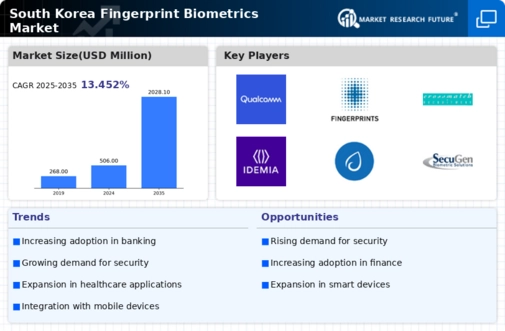The South Korea Fingerprint Biometrics Market is rapidly evolving, driven by increasing demand for secure and convenient authentication solutions across various sectors, including banking, telecommunications, and consumer electronics. As organizations seek ways to enhance security and user experience, the competitive landscape is characterized by a mix of innovative technology providers, established players, and emerging startups.
The market is distinguished by the integration of advanced fingerprint recognition technology in mobile devices, smart home applications, and security systems, reflecting a growing focus on biometric authentication as a standard practice in daily transactions. In this dynamic environment, companies are investing heavily in research and development to enhance the speed, accuracy, and reliability of fingerprint recognition systems, thereby fostering a competitive edge in this highly sought-after market.
Qualcomm has established a strong presence in the South Korea Fingerprint Biometrics Market through its advanced mobile platform solutions that incorporate biometric capabilities. The company's innovative technologies provide a seamless integration of fingerprint sensors in smartphones and other devices, enabling manufacturers to enhance user authentication processes while maintaining device performance. Qualcomm's strengths lie in its extensive portfolio of high-performance chipsets that support advanced algorithms for fingerprint recognition, offering superior speed and accuracy.
With a robust infrastructure in South Korea, Qualcomm collaborates closely with local manufacturers to deliver cutting-edge solutions tailored to meet the unique needs of the market, thereby solidifying its position as a key player in the fingerprint biometrics landscape.Fingerprint Cards has positioned itself as a leading entity in the South Korea Fingerprint Biometrics Market, recognized for its wide array of fingerprint sensors and related technologies.
The company's offerings include both optical and capacitive fingerprint sensors that are utilized in various applications, from mobile devices to access control systems. Fingerprint Cards has developed strategic partnerships with local device manufacturers, which have contributed to its strong market presence and recognition within the region.
The company's commitment to innovation is evident through its continuous refinement of product lines, focusing on enhancing the precision and efficiency of fingerprint recognition. Recent mergers and acquisitions have further strengthened Fingerprint Cards' capabilities and market reach in South Korea, allowing it to leverage synergies that drive technological advancements and broaden its customer base in this competitive sector. Fingerprint Cards remains focused on expanding its footprint through tailored solutions that resonate with local consumer preferences and security needs.


















Leave a Comment